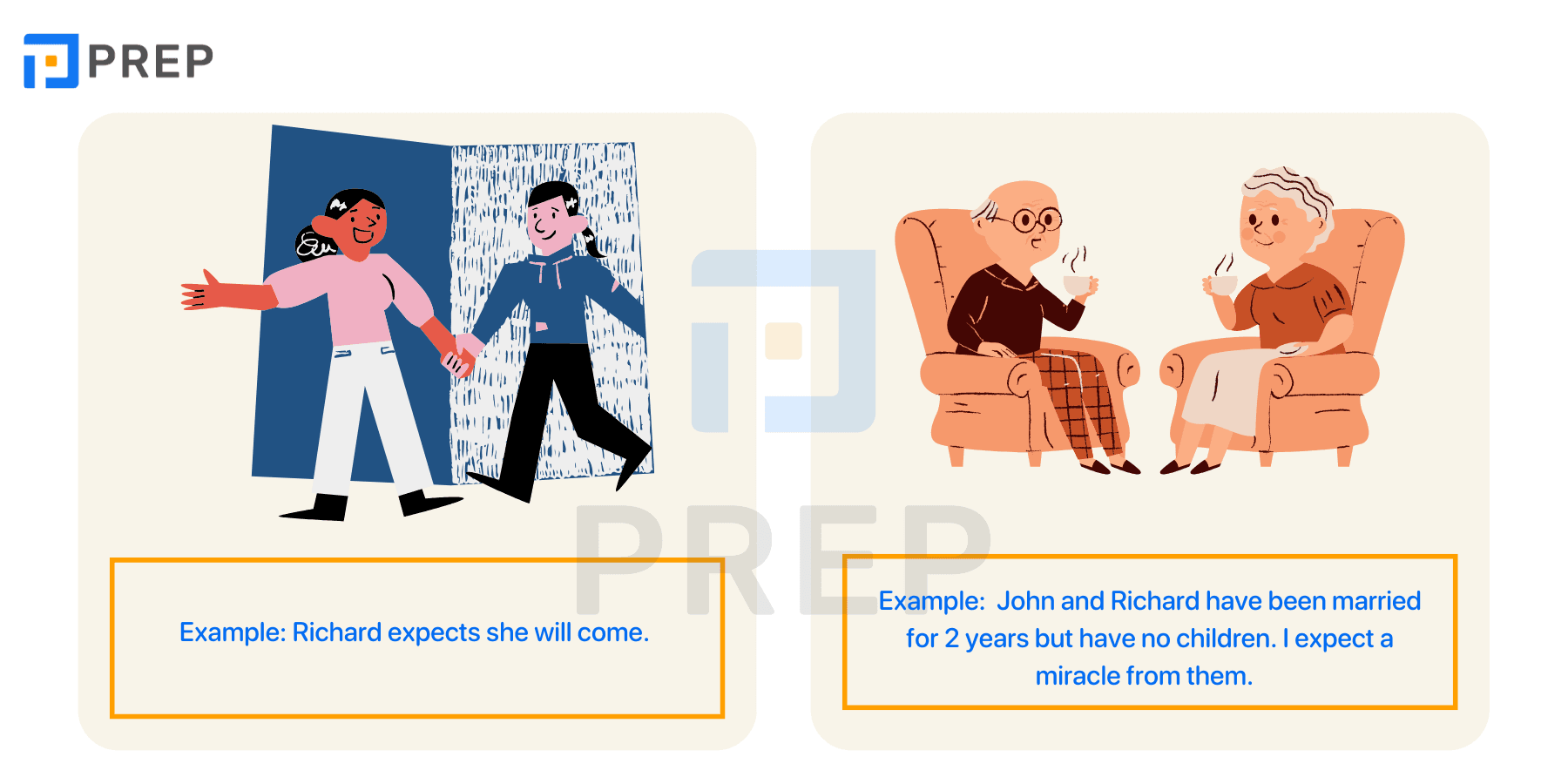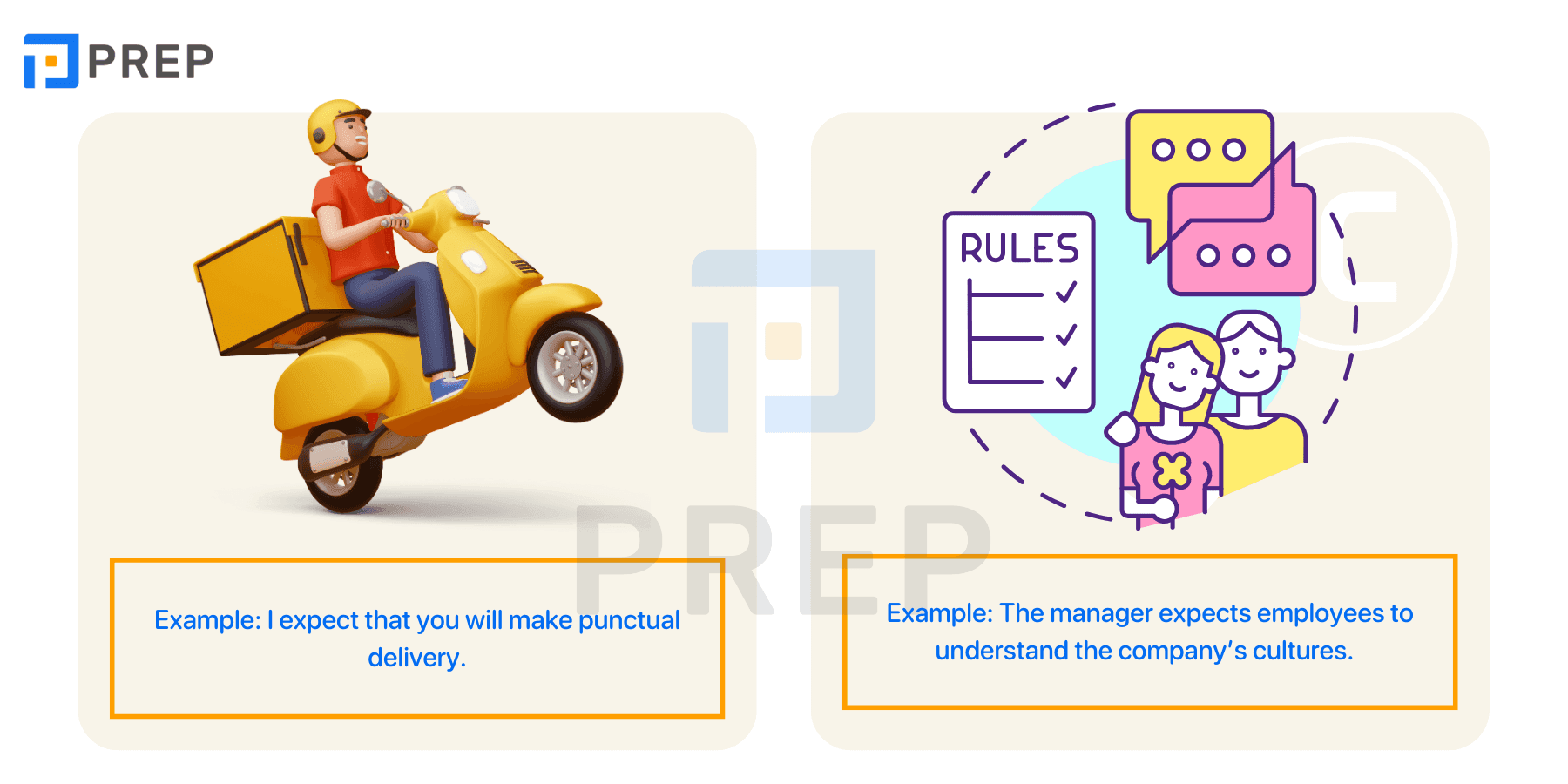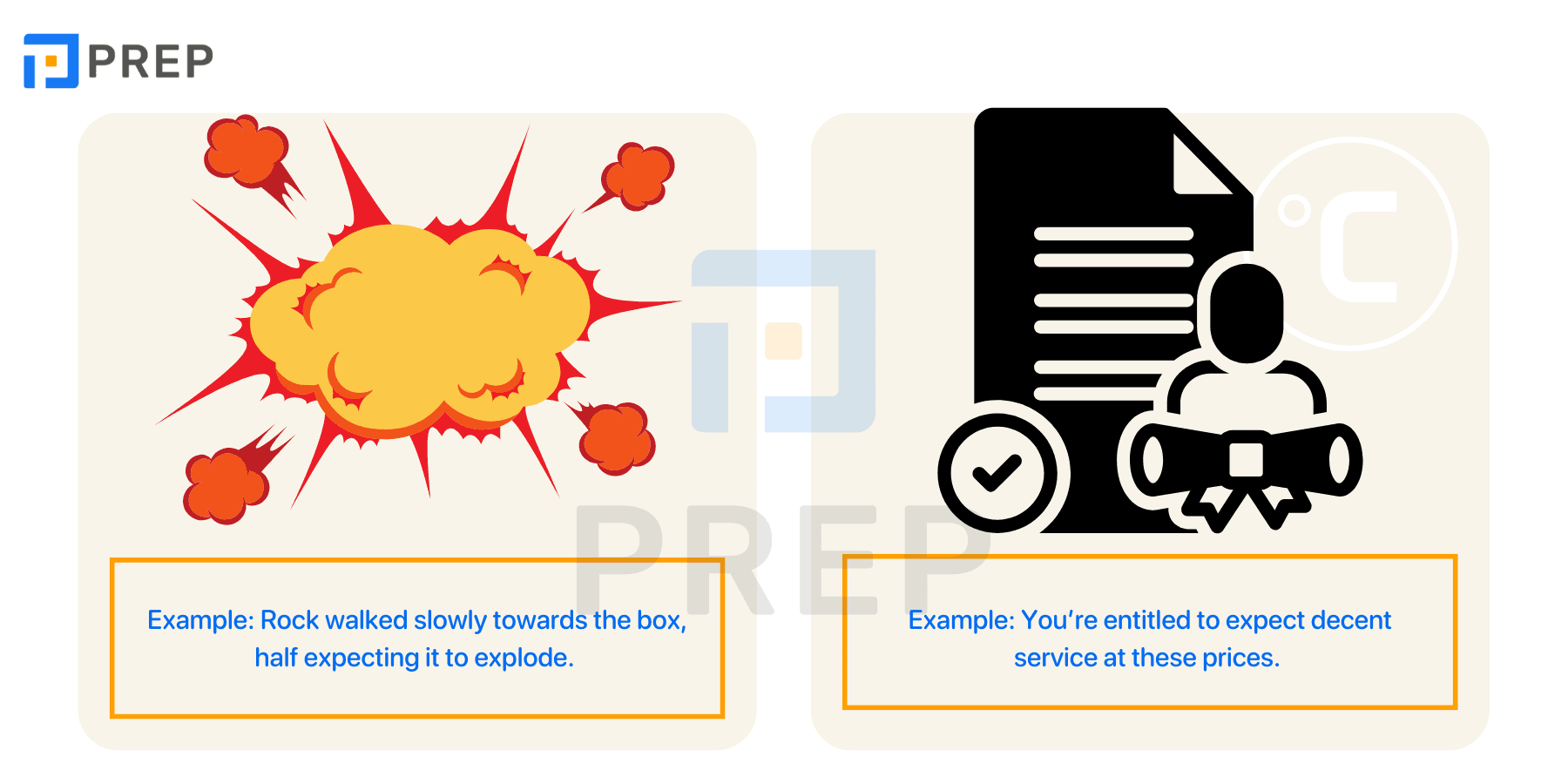What is Expect in English? Distinguishing Expect, Hope and Look Forward To
To express what you anticipate in the future, you can use Expect in English. How is Expect in English used? What are the differences between Expect, Hope, and Look Forward? Let’s explore below!

I. What is Expect in English?
Expect is pronounced /ɪkˈspekt/ and functions as a transitive verb. The Expect meaning in English is: to think or believe something will happen, or someone will arrive. Expect is typically followed by a direct object. For example:
-
Richard expects she will come.
-
John and Richard have been married for 2 years but have no children. I expect a miracle from them.

II. How to use Expect in English
Let’s explore how to use Expect in English below!
1. Structure of Expect in English
You can see how to use Expect in English through the following structures:
|
Structure |
Example |
|
Expect + Object |
She’s expecting a third baby. |
|
Expect + to-V |
They expect to have a child next month. |
|
Expect + that + Clause |
I expect that you will make punctual delivery. |
|
Expect + Object + to-V |
Emi expects everyone to run around after her. |
|
S + expect + something from + somebody/something |
Jackson expects sympathy from everyone. |
2. Usage of Expect in English
2.1. To think or believe that something will happen, or that someone will arrive
Expect can be used similarly to "think" or "suppose", indicating that the speaker believes something will occur or should occur. When using "Expect" in this sense, it is generally not used in continuous tenses. For example:
-
Johnathan is home, I expect that.
-
Xavia should have done her homework by now, I expect so.
2.2. To think that someone should behave in a particular way or do a particular thing
We use Expect to indicate that we are waiting for or hoping for something to occur. The structures that express this meaning are as follows:
|
Usage of Expect |
Example |
|
S + expect + to V |
John expects to have a new job next year. |
|
S + expect + O + to V |
The manager expects employees to understand the company’s cultures. |
|
S + expect + that + S + V |
I expect that Anna can join my party. |
3. Notes on using Expect in English
Although the above structures are quite similar and often interchangeable, there can still be semantic differences in certain cases. You can see the distinction in the two example sentences below:
-
Emi expects Jack to come to the party.
-
Emi expects that Jack will come to the party.

III. Common words/phrases that go with Expect in English
Here are some common collocations and idioms with Expect in English that you can refer to for more natural and fluent English usage:
|
Collocation/idioms |
Example |
|
Fully expect |
I fully expected to win. |
|
Confidently expect |
I confidently expected to be elected again. |
|
Half expect |
Rock walked slowly towards the box, half expecting it to explode. |
|
Really expect |
Peter didn’t really expect her to come. |
|
Rightly expect |
The public rightly expects government officials to be honest. |
|
Hardly expect |
You can hardly expect a child of three to know the difference between right and wrong. |
|
As expected |
Tickets have not been sold as well as expected. |
|
Somebody is entitled to expect something |
You’re entitled to expect decent service at these prices. |
|
It is reasonable/unreasonable to expect something |
It’s unreasonable to expect a tenant to pay for repairs to the outside of the house. |

IV. Distinguishing Expect, Hope and Look Forward To
Do “Hope” and “Look Forward To” synonym for Expect? for Expect, Hope, and Look forward to are all used to express the speaker's desire regarding an upcoming event. However, there are differences in their meanings. Let’s analyze each term closely:
1. Distinguishing Expect and Hope
|
Expect |
Hope |
|
|
Usage |
Expect conveys a degree of certainty that an event will happen, based on evidence, information, or past experience. |
Hope implies a desire or wish for a result without certainty. |
|
Example |
We expect to do well on the exam because we studied hard. |
We hope it doesn’t rain on our wedding day. |
2. Distinguishing Expect and Look forward to
|
Expect |
Look forward to |
|
|
Usage |
Expect indicates a desire for something to happen |
Look forward to expresses excitement or anticipation about something happening in the future. |
|
Example |
Anne expects Emi will come to her 15th birthday. |
Anne is looking forward to her 15th birthday. |
V. Exercises with Expect in English
To better understand Expect in English, let’s complete the exercises below!
1. Exercise
Exercise 1: Fill in the blanks with appropriate words.
-
We ____ they aren’t late.
-
We still ____ them to do it.
-
Adam doesn’t ____ to the holidays – Adam still has to work.
-
She ____ so much of me that I think I’ll disappoint them.
-
They ____ you to work a six-day week.
Exercise 2: Choose the correct form of the verb in parentheses.
-
I am expecting your team ________ (join) this competition.
-
David is expecting ________ (have) another chance.
-
She expects that he’ll ________ (wear) that bright blue shirt.
-
He doesn’t expect her ________ (pass) the test.
-
Crystal is expected ________ (be) a good teacher.
2. Answer
|
Exercise 1 |
Exercise 2 |
|
|
The above information covers all the necessary structures and knowledge about Expect in English. Don't forget to complete your homework to become proficient in this grammar topic. Wishing you effective studying!

Hi I'm Chloe, and I am currently serving as an Product Content Administrator at Prep Education. With over five years of experience in independent online IELTS study and exam preparation, I am confident in my ability to support learners in achieving their highest possible scores.
Comment
Premium content
View allPersonalized roadmap
Most read












